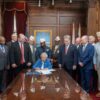Alabama Department of Veterans Affairs commissioner Kent Davis on Monday announced his selection for chairwoman of a newly formed state task force aimed at curbing veteran suicides.
Davis said by phone Monday that Paulette Risher will head the task force. Risher, a retired U.S. Army general with a background in psychology, is also the CEO of Still Serving Veterans, a Huntsville nonprofit that helps veterans reintegrate into civilian life.
“I hope we can find out pretty quickly why Alabama is a little unique and why the rate in Alabama is so high,” Davis said of the state’s rate of veteran suicides.
According to a report by the U.S. Department of Veterans Affairs in Alabama in 2016, the last year for which data is available, veterans died by suicide at a rate of 34.2 percent per 100,000 people. That’s compared to the national average of veteran suicides of 30.1 percent.
Alabama had the 15th highest rate of veteran suicides in the nation in 2016, according to the report. Nationally, an average of 20 veterans kill themselves every day in the U.S.
Davis said the American Legion office in Montgomery ranks Alabama’s rate of veteran suicides as the second worst in the nation, but attempts to reach that office Monday afternoon to discuss that estimation were not immediately successful.
“I am extremely honored to be selected to serve in this position,” said Risher in a press release from the state Department of Veterans Affairs on Monday. “I am so thankful to Governor Ivey and our Legislature for recognizing the importance and urgency of addressing Veteran suicides among Alabama’s large Veteran population. It is heartbreaking to think that a service member can risk their life in service to the nation only to come home and take their own life.”
For Rep. Neil Rafferty, D-Birmingham, the mater of veteran suicides is personal. He lost a close friend to suicide in 2017. Rafferty said his friend had battled post-traumatic stress disorder and substance abuse after serving two tours in Iraq as a U.S. Marine.
Rafferty, a U.S. Marine Corp veteran himself, is currently research and development director at Birmingham AIDs Outreach.
His friend had attempted suicide once before, Rafferty said, but was doing better when things took another dark turn. Rafferty said his friend got drunk one day crashed a friend’s car before disappearing.
Rafferty and friends searched for him with no luck, and as they prepared to end the search one night they heard on the news that a man had thrown himself in front of a train, he said.
“We found out it was our friend, and he’s not the only one…I’ve known more people that died from suicide than died in combat,” Rafferty said.
After taking office in 2018 Rafferty sponsored legislation to create the task force, modeling it in part on a similar task force in Illinois. Lawmakers passed Rafferty’s resolution during the tumultuous last legislative session.
Rafferty said the purpose of the task force is to bring all stakeholders together, investigate the problem and find evidence-based solutions.
The nine-member task force will be made up of one representative from the state Department of Veterans Affairs, who will act as chair, one member appointed by the speaker of the House, one by the president of the Senate, one by the Senate minority leader, one representative from the state Department of Mental Health, one from the state Department of Public Health and a member appointed by Gov. Kay Ivey.
Two other appointments to the task force have already been made. Rep. Ed Oliver, R-Dadeville, was appointed to the task force by Alabama House Speaker Mac McCutcheon.
Alabama Department of Mental Health Commissioner Lynn Beshears’ appointment to the task force is Tammie McCurry, executive assistant to the associate commissioner for Mental Health and Substance Abuse Services Division of the state Department of Mental Health.
The task force will have two years to complete its investigation and determine what steps to take to address the problem, and report those findings to the state legislature, Rafferty said.
There’s a gap between those that need help and the agencies and organizations that provide it, Rafferty said.
“There are obviously great grassroots efforts going on,” Davis said. The task force will bring all of those nonprofit organizations together along with state and federal agencies to best study the problem.
“Are their geographic areas of the state that we’re not reaching out to?,” Davis asked. The veteran LGBTQ community may also make up a larger percentage of those veterans who commit suicide, he said. All of those areas will be investigated by the task force, he said.
“There’s not going to be a simple answer. There’s not going to be simple solution” Rafferty said, but the hope is that the task force will leverage the knowledge of all the participants and prevent more lives from being lost.
Veterans in crisis, or someone concerned about one, can call the Veterans Crisis Line at 1-800-273-8255 and press 1 to talk to someone. Text the Veterans Crisis Line at 838255 or visit VeteransCrisisLine.net.



















































